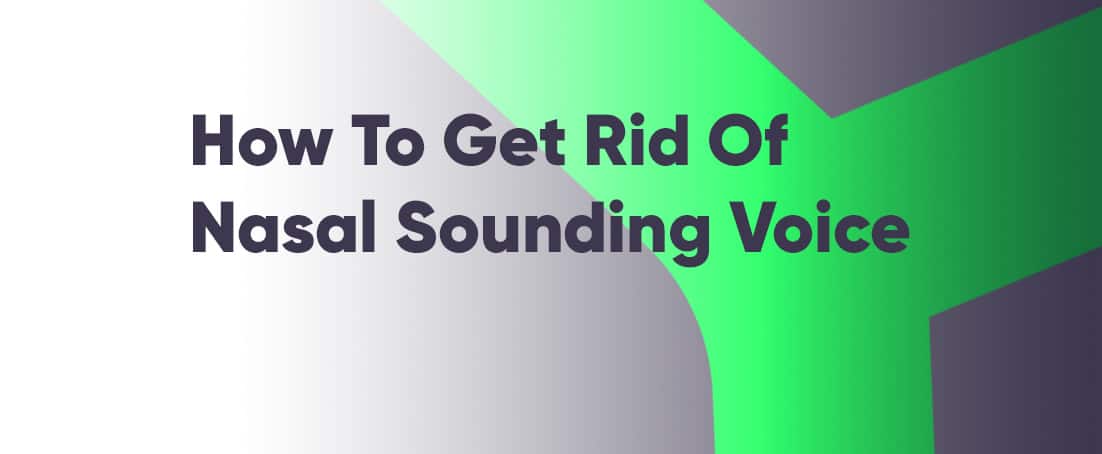A nasal voice happens when the back of your soft palate or velopharyngeal valve doesn’t completely close against the upper walls of the throat. This results in an open nasal cavity, which can cause nasal air emission (air escaping through the nose instead of the mouth).
Nasal speech can lead to frustration and self-consciousness, so many people turn to speech therapy or alternative correction methods. For many, mewing tops the list. Using the mewing technique, you can address any sources of insecurity on your face and fix them accordingly.
Take a quick quiz below to get a personalized workout program that will help you get rid of your nasal sounding voice.
Today, we’ll learn:
- 📝 What leads to nasal airflow and thin voice
- 👄 How to get rid of a nasally voice through nasal voice treatment
- ✔️ How to prevent too much nasal resonance.
Let’s delve into the causes of the condition and what steps you should take to diagnose nasal speech and get rid of it!

What Does a Nasal Speech Sound Like and What Are the Symptoms?
Nasal speech, also known as hypernasal speech, is a common condition that can affect anyone. Has anyone ever told you that you sound like you have a cold or are congested? This is the first symptom of nasal speech.
When speaking about nasal speech, many wonder, “What is a nasal lisp?” If you have difficulty pronouncing certain vowel sounds, along with a reduced clarity of speech and trouble breathing through your nose, you might suffer from hypernasal voice or lisp.
Apart from these, you might develop a sore throat and a cough due to increased mucus production, snoring, loss of taste and smell, and pain around your eyes, cheeks, and forehead.
While the condition itself isn’t serious, it can still affect your everyday life. That said, let’s take a look into what causes nasal speech in adults.
What Causes a Nasal Sounding Voice?
The nasal voice, also referred to as blocked nasal voice, congested voice, or stuffy voice, can be caused by both physiological and environmental factors. Although a simple nasal obstruction can be the common cause of a nasal sound in adults, there are certain medical conditions that can contribute to this issue:
- Anatomy of the Vocal Tract. When speaking, your vocal cords in the larynx produce sound waves, which travel through the vocal tract. The anatomy of your vocal tract can affect the nasal resonance of these sound waves and how your voice sounds. This may commonly be referred to as your ‘voice box’.Additionally, asymmetrical lips can impact the shape of your oral cavity and cause you to sound like you’re speaking through your nose. Thankfully, fixing asymmetrical lips is a possibility and can help you get rid of your snotty voice.
- Blockage in the Nasal Passages. When there is an obstruction in the nasal passages, mostly due to allergies, air can flow through the mouth and nose simultaneously, resulting in nasality.
- Nasal Congestion and Allergies. In case of nasal congestion, your nasal passages might become inflamed and swollen. This can block the normal flow of air through the nasal cavity, resulting in a pinched voice.
- Insufficient Respiratory Support. When you speak, air from your lungs flows through your vocal cords. However, if there’s not enough air or pressure, you might end up with a strained voice. If you’ve ever asked yourself, ”Why do I talk so low?” this might answer your question. Additionally, weak face muscles can contribute to blocked nose voice, as they can impact the movement of the soft palate and other structures in the mouth and nose.
- Poor Articulation. By articulation, we mean the movements of the lips and tongue, which create vowel sounds. Due to poor circulation, these sounds might not be produced clearly, which can be the culprit behind your whiny voice.
What Disease Causes Nasal Speech?
Nasal speech isn’t usually a cause for concern, but if you find yourself asking, ”Why am I nasally all the time,” it’s worth consulting your doctor or speech therapist to identify the underlying cause.
One of the most common medical conditions that cause your nasal quality is sinusitis, which can be the result of a viral, bacterial, or fungal infection. However, more serious conditions, such as cleft palate, Parkinson’s disease, and multiple sclerosis, can lead to nasal speech.
How to Get Rid of a Nasal Sounding Voice When Talking?
A nasal quality results in nose and mouth breathing impact, which can be frustrating and affect your ability and confidence to communicate properly.
So, how do you get rid of nasal voice naturally?
-
Mewing
An easy-to-do method that has increased in popularity over recent years is mewing. This technique involves placing your tongue on the roof of the mouth and keeping it there for some period of time. So, does mewing help in the case of nasal speech?
The overall body posture, including the posture of your tongue, is actually very important for clear speech. As mewing can help you realign your teeth and plays a huge role in relieving tight jaw tension, the method can be extremely helpful in helping you get rid of your hyponasal voice.
-
Breathing Exercises
There are also some breathing exercises you can practice to fix nasal sounds, such as paused breathing or belly breathing. These can help with strengthening your tongue muscles and improving the quality of your speaking voice.
-
Voice Exercises
You might think singers are the only ones in need of voice exercises, and that’s where you’re wrong. Your voice is a muscle that can be exercised to improve the sound it produces. Warm-ups that singers use, such as the yawn-sigh technique and the vocal straw exercise, can help you improve your nasal sound.
-
Medications for Allergies and Nasal Congestion
Besides natural remedies, you can also turn to medications. If you have trouble breathing and experience pain around your eyes, cheeks, and nose, nasal decongestions can provide you with short-term relief.
If your nasal speech is a side-effect of allergies, allergy medications such as cetirizine or desloratadine might do the job.
-
Consuming a Lot of Fluids
Don’t forget to drink plenty of fluids daily, as this can result in more vocal stability and a wider pitch range. Like many organs, your vocal folds and muscles need to be hydrated to function properly.
-
Using a Humidifier
The cause of your nasal speech could also be environmental. Where you live can impact the functions of your nose and mouth. That’s why using a humidifier to purify the air you breathe is vital.
-
Using Articulation Techniques
To stop speaking nasally, you can try recording yourself while speaking and implement nasal voice exercises accordingly. Most importantly, you should be confident in your speech and mindful of its speed.
-
Surgery (Adenoidectomy, Tonsillectomy, Rhinoplasty, Palatoplasty, Pharyngoplasty)
Natural techniques don’t always work if the cause of your nasal speech is a more serious condition. In cases like these, you might need to perform surgery. Speech surgeries can help correct the anatomical and functional problems that are causing your speech disorders.
-
Seeking Professional Advice (ENT Specialist, Voice Coach, Speech Therapist)
If you’re struggling to fix the issue of nasal speech, you can always seek help from a voice coach, speech therapist, or ENT specialist. They can help you diagnose your condition and provide you with advice on how to reach optimal oral resonance.
How to Prevent Nasal Voice
Anyone may experience nasal congestion here and there, but a constant nasal voice isn’t normal. If you’re experiencing structural problems, you might require surgery. Otherwise, an exercise plan from a speech pathologist is the best way to ensure you’re at no risk for hyponasal speech.
You can try mewing as a part of your everyday life to help you prevent nasal sounds, along with drinking plenty of fluids and reducing alcohol consumption.
Bottom Line
In a nutshell, your nasal-sounding throat can be caused by various factors. Even though some of them are common and aren’t a cause for concern, you might be dealing with an underlying condition, and that’s why addressing this issue is a must.
However, it’s always better to prevent it than treat it, as nobody wants to have a thin and snotty voice. There’s no saying if a nasal voice is good or bad, as it might come naturally, but you have a say in preventing it and treating it!
Try our Mewing.coach app – it’s a swift nasal voice fix!



